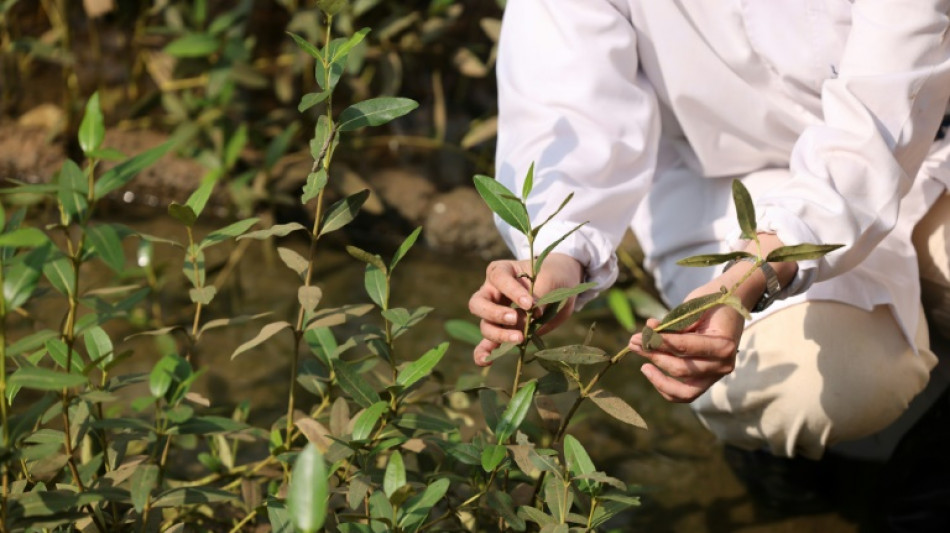
-
 Fans cheer for absent Ronaldo as Saudi row deepens
Fans cheer for absent Ronaldo as Saudi row deepens
-
Violence-ridden Haiti in limbo as transitional council wraps up

-
 Hundreds protest in Milan ahead of Winter Olympics
Hundreds protest in Milan ahead of Winter Olympics
-
Suspect in murder of Colombian footballer Escobar killed in Mexico

-
 Colombia's Rodriguez signs with MLS Minnesota United
Colombia's Rodriguez signs with MLS Minnesota United
-
Wainwright says England game still 'huge occasion' despite Welsh woes

-
 WADA shrugs off USA withholding dues
WADA shrugs off USA withholding dues
-
France detects Russia-linked Epstein smear attempt against Macron

-
 Winter Olympics to open with star-studded ceremony
Winter Olympics to open with star-studded ceremony
-
Trump posts, then deletes, racist clip of Obamas as monkeys

-
 Danone expands recall of infant formula batches in Europe
Danone expands recall of infant formula batches in Europe
-
Trump deletes racist video post of Obamas as monkeys

-
 Colombia's Rodriguez signs with MLS side Minnesota United
Colombia's Rodriguez signs with MLS side Minnesota United
-
UK police probing Mandelson after Epstein revelations search properties

-
 Russian drone hits Ukrainian animal shelter
Russian drone hits Ukrainian animal shelter
-
US says new nuclear deal should include China, accuses Beijing of secret tests

-
 French cycling hope Seixas dreaming of Tour de France debut
French cycling hope Seixas dreaming of Tour de France debut
-
France detects Russia-linked Epstein smear attempt against Macron: govt source

-
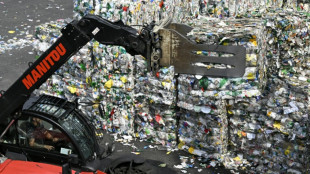 EU nations back chemical recycling for plastic bottles
EU nations back chemical recycling for plastic bottles
-
Terror at Friday prayers: witnesses describe blast rocking Islamabad mosque

-
 Iran expects more US talks after 'positive atmosphere' in Oman
Iran expects more US talks after 'positive atmosphere' in Oman
-
US says 'key participant' in 2012 attack on Benghazi mission arrested
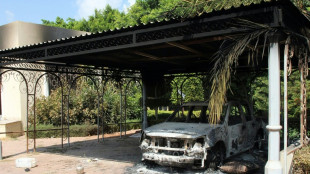
-
 Why bitcoin is losing its luster after stratospheric rise
Why bitcoin is losing its luster after stratospheric rise
-
Arteta apologises to Rosenior after disrespect row

-
 Terror at Friday prayers: witness describes 'extremely powerful' blast in Islamabad
Terror at Friday prayers: witness describes 'extremely powerful' blast in Islamabad
-
Winter Olympics men's downhill: Three things to watch

-
 Ice dancers Chock and Bates shine as US lead Japan in team event
Ice dancers Chock and Bates shine as US lead Japan in team event
-
Stellantis takes massive hit on 'overestimation' of EV demand

-
 Stocks rebound though tech stocks still suffer
Stocks rebound though tech stocks still suffer
-
Spanish PM urges caution as fresh rain heads for flood zone
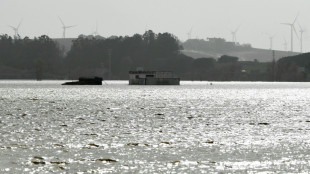
-
 Iran says to hold more talks with US despite Trump military threats
Iran says to hold more talks with US despite Trump military threats
-
Russia accuses Kyiv of gun attack on army general in Moscow

-
 Cambodia reveals damage to UNESCO-listed temple after Thailand clashes
Cambodia reveals damage to UNESCO-listed temple after Thailand clashes
-
Norway crown princess 'deeply regrets' Epstein friendship

-
 Italy set for Winter Olympics opening ceremony as Vonn passes test
Italy set for Winter Olympics opening ceremony as Vonn passes test
-
England's Jacks says players back under-fire skipper Brook '100 percent'

-
 Carrick relishing Frank reunion as Man Utd host Spurs
Carrick relishing Frank reunion as Man Utd host Spurs
-
Farrell keeps the faith in Irish still being at rugby's top table

-
 Meloni, Vance hail 'shared values' amid pre-Olympic protests
Meloni, Vance hail 'shared values' amid pre-Olympic protests
-
Olympic freestyle champion Gremaud says passion for skiing carried her through dark times

-
 US urges new three-way nuclear deal with Russia and China
US urges new three-way nuclear deal with Russia and China
-
Indonesia landslide death toll rises to 74
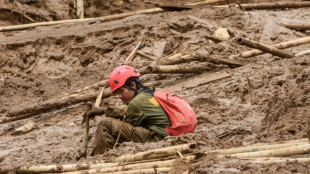
-
 Hemetsberger a 'happy psychopath' after final downhill training
Hemetsberger a 'happy psychopath' after final downhill training
-
Suicide blast at Islamabad mosque kills at least 31, wounds over 130

-
 Elton John accuses UK tabloids publisher of 'abhorrent' privacy breaches
Elton John accuses UK tabloids publisher of 'abhorrent' privacy breaches
-
Lindsey Vonn completes first downhill training run at Winter Olympics

-
 Digital euro delay could leave Europe vulnerable, ECB warns
Digital euro delay could leave Europe vulnerable, ECB warns
-
Feyi-Waboso out of England's Six Nations opener against Wales

-
 Newcastle manager Howe pleads for Woltemade patience
Newcastle manager Howe pleads for Woltemade patience
-
German exports to US plunge as tariffs exact heavy cost

| CMSC | 0.02% | 23.555 | $ | |
| BCC | 2.77% | 91.7 | $ | |
| SCS | 0.12% | 16.14 | $ | |
| NGG | 1.26% | 87.995 | $ | |
| BCE | -1.55% | 25.18 | $ | |
| RIO | 2.61% | 93.565 | $ | |
| CMSD | 0.17% | 23.93 | $ | |
| JRI | 0.54% | 12.95 | $ | |
| AZN | 3.45% | 193.855 | $ | |
| BTI | 1.33% | 62.795 | $ | |
| GSK | 1.94% | 60.34 | $ | |
| RYCEF | 1.54% | 16.88 | $ | |
| RBGPF | 0.12% | 82.5 | $ | |
| VOD | 3.21% | 15.105 | $ | |
| RELX | -2.49% | 29.36 | $ | |
| BP | 2.09% | 38.985 | $ |

Oman revives CO2-busting mangroves as climate threat lurks
In a muddy wetland in Oman's capital, environmental scientist Zakiya al-Afifi measures the bark of a mangrove tree, estimating its capacity to absorb the carbon dioxide that is slowly heating the planet.
Standing in the leafy reserve, shielded from the fierce sun, she says the Al-Qurm forest's 80 protected hectares (197 acres) of mangroves could lock away thousands of tons of CO2.
"Mangroves are the richest carbon sink in the world," says Afifi, wearing boots and a white lab coat as she leads a group of university students around the swamp.
If the shoreline trees and bushes have become part of efforts to cut atmospheric CO2, oil-producing Oman, on the Arabian peninsula's southeast, has led the way in this hydrocarbon-rich region.
Inspired by the late ruler Sultan Qaboos bin Said, a renowned conservationist who died in 2020, the country of 4.5 million people has become the Gulf's centre for mangrove restoration and preservation.
Mangrove habitats can remove carbon dioxide from the atmosphere at a faster rate than forests and store it in their soil and sediment for longer periods.
"Mangroves are recognised as one of the nature-based solutions to fight climate change," says Afifi, 41.
Up to 80 tons of CO2 per hectare could be stored in Al-Qurm's above-ground biomass, and even more in the muddy sediments below, she adds.
- 'Maybe we will lose them' -
Oman, a minor oil producer compared with its neighbours the United Arab Emirates and Saudi Arabia, is moving quickly in its project to revive the forests that once covered the country, but died out thousands of years ago because of climatic changes.
The reason for its haste is modern, man-made climate change -- much of it from burning fossil fuels -- which risks destroying the mangroves with higher temperatures, floods and cyclones.
"If we are not going to restore more forests, it means maybe one day we will lose them" due to climate change, Afifi says.
Trudging through a murky creek north of Muscat, Badr bin Saif Al Busaidi of Oman's environmental authority points to a dense thicket of mangrove trees.
"There was not a single tree here" two decades ago, the 40-year-old tells AFP from the Al-Sawadi creek, his boots ankle-deep in water.
"Now, it is a forest that stretches more than four kilometres (2.5 miles)" with 88 hectares of mangrove cover, says Busaidi.
Since 2001, a restoration project has revived these biodiversity hotspots that now cover around 1,000 hectares across the country's coast.
Over the past two years, Oman has planted more than 3.5 million seeds directly in targeted areas, including a record two million this year.
"Next year the numbers will be even higher," Busaidi says, adding: "We are living what we can call a war with nature because of climate change.
"If we don't take action, we will lose these natural resources."
- Sowing the seeds -
Oman's restoration project has evolved slowly. At first it relied on mangrove nurseries, two of which are in Al-Qurm, growing 850,000 seedlings for transfer to coastal areas.
In 2021, the conservationists tried using drones to disperse seeds, but after disappointing results they focused on the current approach of direct, targeted planting.
Oman is also helping fulfil carbon credit schemes which have become popular tools for companies seeking to offset their carbon emissions.
A single credit represents one tonne of carbon dioxide removed or reduced from the atmosphere. Credits are generated through activities such as planting mangroves or rehabilitating forests.
This month, the environment authority signed a contract with Oman's MSA Green Projects Company to plant 100 million trees over four years.
As part of the initiative, 20,000 hectares of land in Al Wusta governorate will be transformed into mangrove habitats, partly using artificial lakes.
Once completed, the project is predicted to eliminate 14 million tonnes of CO2 and generate $150 million through carbon credit certificates, the environmental authority said.
Carbon credits' legitimacy has come under scrutiny as the trees must grow to maturity and never burn down if they are to permanently store CO2. Monitoring and certification standards can be slack, reports have found.
Oman's carbon offsets could also be measured against its emissions, which amounted to 71 million tonnes of CO2 in 2021 according to the Global Carbon Project.
"Past generations didn't think much about the environment because the impact of climate change" was not as apparent then, student Israa al-Maskari says at a mangrove nursery in Al-Qurm.
"What they did, we now face so we have to save our environment for us and for future generations."
H.Nasr--SF-PST



